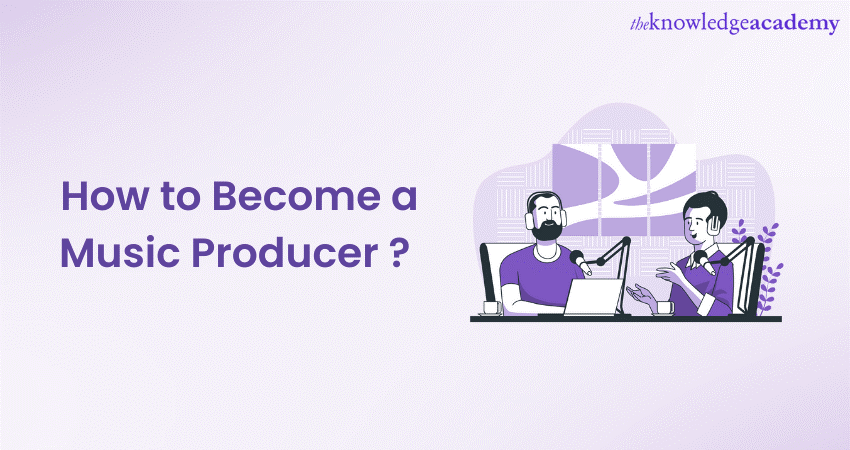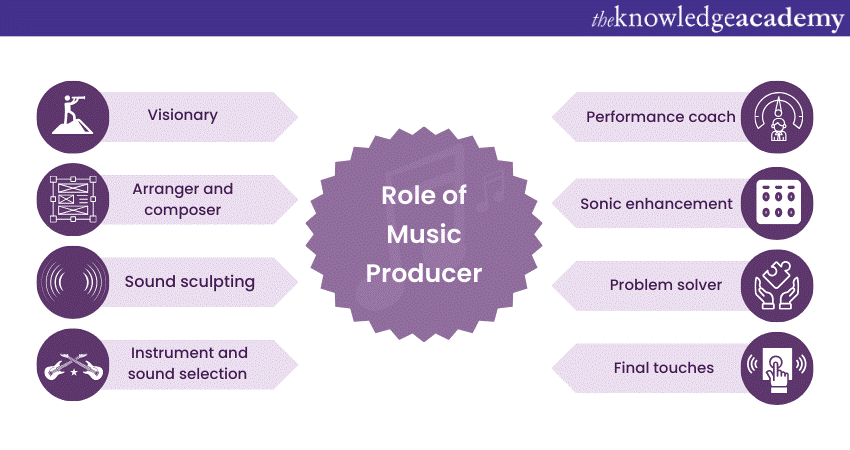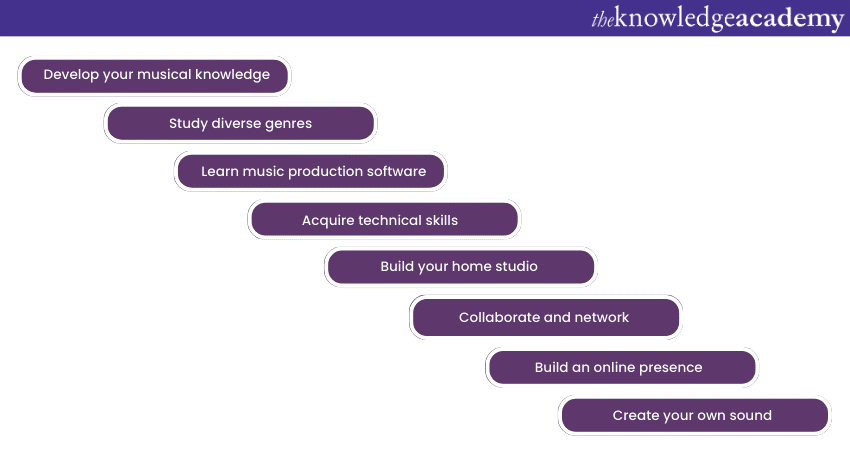We may not have the course you’re looking for. If you enquire or give us a call on +34 932716793 and speak to our training experts, we may still be able to help with your training requirements.
Training Outcomes Within Your Budget!
We ensure quality, budget-alignment, and timely delivery by our expert instructors.

Becoming a Music Producer is a dream shared by many who have a passion for music and a knack for creativity. Knowing How to Become a Music Producer is the first step towards your big dreams. As per Glassdoor, the average salary for a Music producer is £48,470 in the United Kingdom. These statistics clearly demonstrate the potential this field holds for aspiring producers. So, it’s time to invest in learning how to build a successful career. Read this blog to learn How to Become a Music Producer. Also, explore a roadmap to transform your love for music into a thriving career as a skilled Music Producer.
Table of Contents
1) Who is a Music Producer?
2) Role of Music Producer
3) Prerequisites for Music Production
4) Step-by-step guide to becoming a Music Producer
5) Conclusion
Who is a Music Producer?
A Music Producer is like the director of a movie named music. These professionals help create and shape the sound of songs and albums. They work with Musicians, Singers, and other professionals to make sure the music sounds just right. They determine the sounds of instruments and voices, the volume, and how various elements blend to craft a song.
Explore your passions with our Hobbies and Interests Course. Enrich your skills today!
Role of Music Producer
While learning How to Become a Music Producer, the first step is understanding their role. At the core, these professionals are like the conductor of an orchestra. They take the raw musical elements – melodies, lyrics, instruments, and vocals – and blend them together to create a piece of music. The producer's job is to bring out the best in each ingredient, ensuring they complement each other perfectly. Let's break down the different aspects of a Music Producer's role:

Visionary
A Music Producer has a vision for how a song should sound. Just like a film director envisions a scene before shooting, a producer imagines how the final track will come together. They work closely with artists to understand their ideas, emotions, and intentions for the song.
Arranger and composer
Have you ever listened to a song and thought, "This chorus should come earlier," or "This part should be shorter"? That's where the producer's magic comes in. They arrange and structure the song, deciding when verses, choruses, bridges, and other parts should appear. They ensure the song's flow feels natural and engaging.
Sound sculpting
Every sound in a song matters – from the drums to the guitars, vocals, and even subtle background effects. The Music Producer shapes these sounds using various tools and techniques. They adjust the levels of each element, making some parts louder and others softer to create a balanced mix.
Instrument and sound selection
Think of a Music Producer as a painter selecting the right colours for their canvas. They help choose the instruments and sounds that can best express the song's mood. If a song needs a lush, romantic feel, they might opt for a string orchestra. If it's meant to be energetic, they might go for electric guitars and powerful drums.
Performance coach
When recording vocals or instrumentals, the producer plays the role of a coach. They guide the performers to deliver their best performance. They might suggest changes in tone, style, or delivery to ensure the emotion and energy of the song shine through.
Sonic enhancement
Have you noticed how some songs sound "bigger" or "fuller"? That's the producer's role. They add effects like reverb, echo, or compression to enhance the sound and create a unique sonic atmosphere.
Problem solver
In the process of making music, challenges can arise – technical glitches, creative blocks, or disagreements between artists. A producer acts as a problem solver, finding solutions that keep the creative process smooth and focused.
Final touches
Once the recording and mixing are done, the producer adds the finishing touches. This includes mastering – making sure the song's volume levels and overall sound are consistent and polished.

Prerequisites for Music Production
Music Production is about making music by putting different sounds together. To do this, you need the right tools. Here's a list of the things you'll need:
Computer
A powerful computer is the heart of your Music Production setup. Look for a system with sufficient processing power, RAM, and storage to run digital audio workstations (DAWs) and various plugins smoothly.
Digital Audio Workstation (DAW)
A DAW is a software that allows recording, editing, arranging, and mixing audio and Musical Instrument Digital Interface (MIDI) tracks. Popular DAWs include Ableton Live, Logic Pro X, Pro Tools, and FL Studio.
Audio interface
An audio interface joins your computer to microphones, instruments, and studio monitors. It converts analogue signals into digital audio data and vice versa, ensuring high-quality sound recording and playback.
Microphones
The choice of microphone depends on what you're recording. Condenser microphones are often used for vocals and acoustic instruments. In contrast, dynamic microphones are ideal for amplifiers and drums.
MIDI controller
MIDI controllers, such as MIDI keyboards or pads, allow you to input MIDI data into your DAW. They're essential for creating electronic music, triggering virtual instruments, and composing with MIDI.
Studio monitors
Studio monitors are designed for accurate sound reproduction. They help you hear your music as it truly sounds, enabling better mixing and mastering decisions.
Headphones
A good pair of headphones provides a different listening perspective and helps you catch details that might be missed on studio monitors. Search headphones with a flat frequency response.
Cables
High-quality cables are essential for maintaining the integrity of your audio signals. XLR, TRS, and MIDI cables are common types used in Music Production setups.
Acoustic treatment
Proper acoustic treatment helps control the sound environment in your recording space. Bass traps, diffusers, and acoustic panels help minimise reflections and improve sound quality.
External storage
Since music projects can take up a lot of space, having external hard drives or SSDs for backup and storage is crucial to prevent data loss.
Unleash your mixing capabilities with our Art Of Mixing Masterclass. Sign up now to elevate your mixing masterpieces like never before!
Virtual instruments and plugins
Virtual instruments and plugins expand your sonic palette. These software-based instruments and effects offer numerous sounds and processing capabilities.
MIDI and audio cables
These cables connect your instruments, MIDI controllers, microphones, and audio interfaces, allowing data to flow between them.
Instruments
Depending on your style of music, you might need physical instruments like guitars, keyboards, drums or electronic instruments like synthesisers and drum machines.
Step-by-step guide to becoming a Music Producer
Whether you're a music lover or a budding artist, the role of a Music Producer is crucial in bringing music to life. So, let’s explore the essential steps and valuable insights on How to Become a professional Music Producer:

Develop your musical knowledge
Before you enter into producing music, you need a strong foundation in music theory and composition. Learn about scales, chords, melodies, and harmonies. Understanding the elements of music can empower you to create unique and captivating sounds that resonate with your audience.
Study diverse genres
Expose yourself to a wide range of musical genres. Each genre has its own distinct characteristics and production techniques. By immersing yourself in different styles, you can expand your creative toolkit and be better equipped to experiment with various sounds.
Studying these different styles helps you learn cool tricks that musicians use, like how to make your music feel relaxed or exciting. When you implement it in your music, you create something that's uniquely yours. Plus, knowing about different music styles makes you good at working with different musicians who like different kinds of music.
Learn Music Production software
Music Production involves working with Digital Audio Workstations (DAWs). Popular DAWs like Ableton Live, Logic Pro, and FL Studio are essential tools for producers. Invest time in learning the features and functions of your chosen DAW to manipulate audio, arrange tracks, and apply effects.
As you practice using these programs, you can get better at making your music sound amazing. It's like becoming good at playing a video game – the more you play, the better you become. And the cool thing is, once you've learned these programs, you can use them to bring the music in your head to life and share it with the world.
Acquire technical skills
Gain proficiency in recording, mixing, and mastering techniques. Understanding microphone placement, signal processing, and audio editing is vital for producing high-quality music. Online tutorials, courses, and hands-on practice can help you refine your technical skills.
While these technical skills might initially seem complex, they become more familiar as you practice and gain experience. Mastering them allows you to bring your musical ideas to life with professional quality and precision.
Build your home studio
Creating a conducive working environment is essential. While you don't need a state-of-the-art studio initially, invest in quality headphones, monitors, and audio interfaces. Set up a space where you can focus on your creativity without distractions.
Personalise the space with inspiring artwork, plants, or whatever makes you feel connected to your music. Over time, as you experiment and learn, your home studio can become your artistic sanctuary, where your musical ideas transform into beautiful tracks.
Discover the pianist within you - Join our Piano Masterclass now and elevate your musical journey to new harmonious heights!
Collaborate and network
Collaboration is key in the music industry. Connect with fellow musicians, vocalists, and other producers. Collaborative projects not only improve your skills but also expose you to different perspectives and approaches.
Remember that the music industry is a community. Just as in any community, supporting and being supported by others is essential for growth. Collaboration and networking are tools that can propel your Music Production journey forward, helping you learn, evolve, and make your mark in the world of music.
Create your own sound
Developing a unique sound sets you apart from the crowd. Experiment with various instruments, effects, and techniques to discover your signature style. Your distinct sound can become your trademark in the competitive music landscape.
Your sound might be a fusion of different genres, or it could involve a distinct use of specific instruments or effects. This is your musical fingerprint, and it's what sets you apart from other producers.
Seek feedback
Constructive criticism is invaluable for growth. Share your work with trusted peers or mentors who can provide honest feedback. Use feedback to refine your tracks and enhance your production skills.
Feedback is a two-way street. When you share your work, you open the door for constructive criticism that can lead to improvements. On the flip side, when you give feedback to others, you learn to communicate your thoughts and deeply understand the artistic and technical aspects of Music Production.
Continuous learning
The Music Production field is dynamic and ever evolving. Stay updated with industry trends, new software updates, and production techniques. Attend workshops webinars and read Music Production blogs to keep your skills current.
Furthermore, learning is an integral part of mastering your craft. Each piece of knowledge you gain contributes to your proficiency in Music Production. The pursuit of continuous learning is an effort to refine your skills, strengthen your foundation, and push the boundaries of your potential.
Build an online presence
In today's digital era, having an online presence is crucial. Create a portfolio showcasing your work on platforms like SoundCloud, YouTube, and social media. Building a strong online brand can attract potential clients, artists, and collaborators.
As your online brand grows, you'll notice that it acts as a magnet, attracting fans and potential clients equally. Collaborative opportunities arise as musicians and vocalists like your style and approach. Brands and projects seeking Music Producers may also discover your work, opening new opportunities.
Conclusion
Becoming a Music Producer requires dedication and a genuine love for music. By following this roadmap on How to Become a Music Producer, you can turn your passion into a career in music. Remember that success takes time, perseverance, and patience. With the right skills, knowledge, and determination, you can achieve your dreams.
Elevate your Music Production skills with our comprehensive Music Production Masterclass. Join today and unleash your creative potential!







 Top Rated Course
Top Rated Course



 If you wish to make any changes to your course, please
If you wish to make any changes to your course, please


